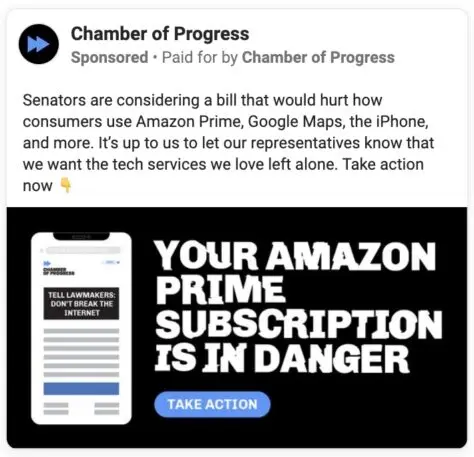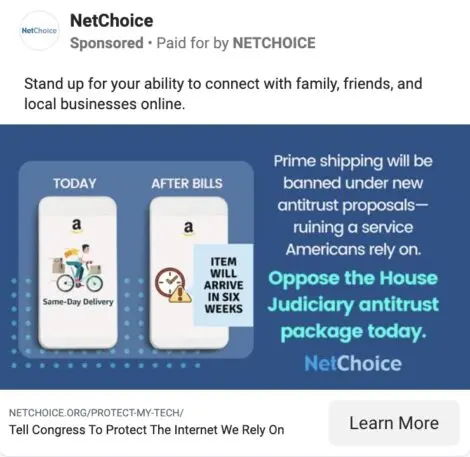Democratic Senator Amy Klobuchar of Minnesota says she’s feeling good about her chances of passing the first significant antitrust reform since the dawn of the internet.
Just a few days have passed since last Thursday’s hearing to mark up the American Innovation and Choice Online Act, introduced with Republican Senator Chuck Grassley of Iowa. The bill would prohibit Big Tech platforms such as Amazon and Apple from taking advantage of their gatekeeper status to give themselves advantages at the expense of resellers and third-party developers that also sell on the platforms.
Naturally, the tech industry doesn’t like the idea. While the bill has enjoyed bipartisan support, the power of a monied tech lobby has shown itself as the bill has moved closer to a debate and potential vote on the Senate floor. Many industry talking points were parroted by lawmakers during the hearing; some of the concerns raised by those lawmakers had already been addressed in a “manager’s amendment” added before the hearing.
“As the senators are bombarded with $70 million in lobbying, it is easy to listen to that, because you hear the same things over and over again, including on TV ads,” Klobuchar says. “While we are a small and mighty group of senators and staff, it’s a challenge to explain how our manager’s amendment does get at so many of their concerns.”
Chamber of Progress, an industry lobby group funded by Amazon, Google, Meta, and others had argued to senators (and in numerous Facebook ads) that the Klobuchar-Grassley bill would “eliminate both the funding model and logistics model that make [Amazon] Prime possible.” According to Klobuchar, the bill was not designed to impose new rules for subscription offerings such as Prime, and “even though we believe it wasn’t [impacted], we clarified that subscription services weren’t covered.”
Chamber of Progress continues to run its Facebook ads, having spent almost $80,000 on Facebook ads in the last week alone.

Another industry group, NetChoice, which is backed by Amazon, Facebook, and Google, is spreading the same general message—that some of our favorite tech services would disappear if the antitrust bill is passed. The Washington Post’s Aaron Schaffer reported earlier this month that NetChoice has spent more than $1 million on Facebook ads since October, and that its ads have been shown at least 24 million times since last April.
Apple argues that because the bill would allow iPhone users to get apps from places other than the App Store, it could no longer vet every app to ensure the security of its users’ devices. Klobuchar says the managers’ amendment makes it clear that any security and privacy provisions in the platforms would also not trigger any kind of coverage under the bill.

The tech lobby’s biggest talking point leading up to last week’s markup hearing was that the bill would endanger the national security of the U.S. The antitrust bill would do this, the argument goes, by weakening U.S. tech companies and benefiting foreign tech companies such as TikTok and Alibaba, which might not be affected by the legislation.
But Klobuchar says even that concern was addressed in the managers’ markup of the bill, in which the covered entities definition was altered to include private companies with more than $30 billion in yearly revenue, or more than a billion users. That could loop in ByteDance’s TikTok, at least.
We made some practical changes to the bill and we’ll continue to do that.”
Klobuchar says no amount of reassurance or amendment will appease the tech industry. “We made some practical changes to the bill and we’ll continue to do that, but my job is to explain to my colleagues that no matter what we do, no matter what changes they make, if this bill does something to rein in monopoly power [tech companies] will oppose it.”
Klobuchar and her staff believe that the arguments made by the tech industry and its lobby are mainly disingenuous. Their strategy may be to amend the bill to death.
“I’m not doing that,” she says. “Since we haven’t done one new antitrust-competition bill since the advent of the internet—when it’s now 20% of the economy—I think it’s high time we do that and set some rules of the road.”
The clock is ticking. As this year’s midterms approach, it will become harder and harder to move the Klobuchar-Grassley antitrust bill toward a vote on the Senate floor.
Recognize your brand’s excellence by applying to this year’s Brands That Matter Awards before the early-rate deadline, May 3.
